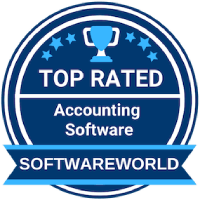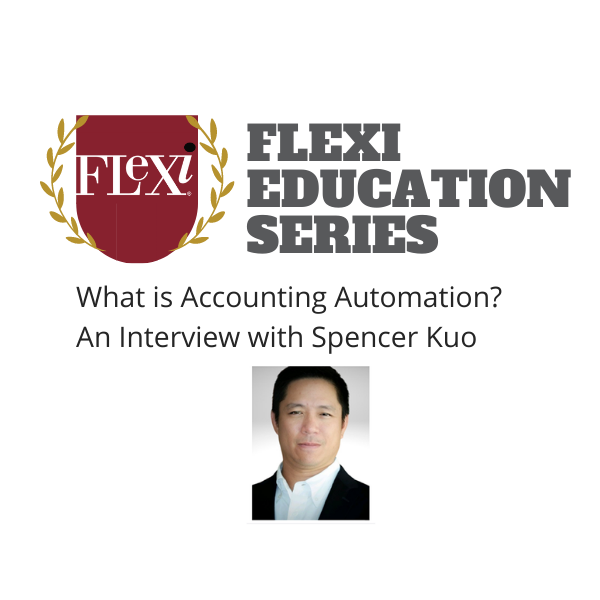Flexi Education Series
What is Accounting Automation? An interview with Spencer Kuo
In our inaugural post for our Flexi Education Series. We sat down with Spencer Kuo. Spencer is Vice President of Solution Consulting at Flexi Software. Recently, we had the pleasure of talking with Spencer about accounting automation and what the future holds for accountants and the accounting practice.
Marc Meyer: Thanks for taking the time to do this Spencer. Let’s jump right into it. What is Accounting Automation?
Spencer Kuo: Accounting automation is a broad category but it’s pretty much the same as any other “type” of automation. We simply want to reduce or replace manual processes that may take an accountant several steps with something that is more a computer can do for them, ultimately benefiting accountants by giving them back more time. Accounting automation is something that continuously evolves over time, largely based on technology. In its most advanced form today, technologies like Artificial Intelligence are being deployed to help accountants make decisions and automate some of the data/and data analysis.
MM; It’s my understanding that accounting automation has evolved because you had certain processes that were repetitive, and so automating them was a natural progression (and easy transition) to automate them. Is that right?
SK: Certainly. Those repetitive tasks were easiest to automate as they are the low hanging fruit of accounting systems. Modern accounting systems can eliminate many of those routine, day-to-day tasks in accounting.
MM: Do you remember when this first happened? How long has accounting automation been “around”?
SK: Well, it’s always been around. There have been accounting automation systems but to different degrees. What automation was available 20 years ago is dwarfed by what was available 10 years ago by what’s available to today, and it’s just going to continue to evolve and improve up to a certain point.
MM: It sounds like the biggest benefit is that you’re reducing manual processes; you’re speeding up certain processes. Am I on the right path?
SK: Yes, there are several major benefits. One benefit is less manual labor so employees can be more productive. The second benefit is a reduction in mistakes or human error as there is less data entry. The system is doing it for me, so you have much more accurate financials.
Why does that matter? It all boils down to better analytics and reporting. So the goal of the accounting function, in terms of bookkeeping, is an effort to provide the data needed to make better decisions that will help the business be more successful, and reports that regulatory bodies need to ensure compliance. By automating the accounting – which ultimately leads to less errors and more accurate data – helps to fulfill these goals.
MM: One question everyone wonders: Are the days of an accountant numbered?
SK: No, on the contrary, it’s just that their roles have shifted from being heads down data entry people to more strategically focused functions that are working towards the strategic goals of the company. They have more time now and better data.
MM: Do you feel like accountants now, rather than just reporting the numbers, have become more like strategists?
SK: Absolutely. Back in the day, accountants were viewed “just” as bookkeepers. They were there to purely record the money and nothing more. The old way of “doing” accounting (and it still exists today) is the concept of what we call ROR or Record to Report: record a bunch of information and create reports. That is what the role of an accountant has been, and often continues to be. The future of accounting automation, though, is less about the recording and more analysis of the information.
We have concrete information to help put accountants at ease. I’ve interviewed some of our Flexi customers informally that have adopted some of our automation technology like Workflow, and I have asked them, “Now that you have implemented Flexi and you have all this automation, what has been the impact on the accounting staff? Were you able to reduce staff?”
The answer was no. Not only had they maintained their existing staff, but they have actually grown. But what has changed is the nature or type of hire that is sought after now versus a decade ago. They used to hire “bean counters” that were lower level data-entry people but now that has changed. So let’s say you had five people. Three would have been data entry, one would have managed them and the other might have been either a controller or a VP of finance. Now, you don’t have data entry people anymore, you have five people who are more data analysts, or business analysts with finance and accounting backgrounds. The number of accountants has not changed, but the skillsets have.
MM: Thus, the reality is that the role or job description of the accountant is pretty far removed from that of the “bean counter”. The core skills needed today are all about the data and being able to analyze that information and make data-based recommendations. Which has me believing that contrary to the fears that accountants’ days are numbered, the accountant is now more valuable than ever.
SK: Exactly. I would say that right now, today, accounting, technology and automation have reached this inflection point in which accounting is automated enough and the analytics and reporting is good enough to enable the accounting department to make that evolutionary shift from being just bean counters to being more of an analytical organization.
MM: Interesting. You mentioned AI earlier. Does automation have AI baked into it? Or is that something that is completely separate from this?
SK: While we’re in the early phases and you can see some of this in Flexi’s accounting software, continued AI advancement is actually the next evolution. Automation has always existed in various forms but AI is just another technology used to accomplish automation. Look to AI being very common as we move towards the next generation of accounting systems.
MM: Then RPA is just taking those manual accounting processes and letting a bot do them in order to free up an accountant to do more valuable activities right?
SK: Yes. We can think of it like this: more routine, repeatable tasks are for the robots whereas the more cognitive and less repetitive tasks are for the accountant.
MM: Interestingly enough, I’ve probably seen more articles about RPA eliminating accounting jobs more than anything else. I actually think RPA augments the functions of an accountant rather than eliminates them. You’ve been pretty adamant that RPA is not a deal killer for accounting.
SK: True. But I do see a deal killer out there for accountants though.
MM: Oooh, let’s hear it.
SK: I can see a shift towards outsourced accounting. Similar to what we’re seeing with HR. We’ve seen it with IT, we’ve seen it with Legal. So accounting is logically next in terms of back-office functions that companies are going to outsource. Honestly, if you want to achieve 100% automation of your accounting functions, then outsourcing it would be the next logical step. If we have decided that the role of the accountant is strictly as an analyst and less of a data-entry person, then the easiest way to do that, would be to outsource that portion.
MM: What industries does accounting automation fit best?
SK: It’s industry agnostic. Every industry needs it but those that are more regulated are the ones that would be most impacted. Anytime there are regulations that create complexity in accounting, then automation can have the biggest return. Financial Services comes to mind based on the amount of regulations.
MM: Insurance?
SK: Yes, banking, insurance, and financial services are pretty notable.
MM: There’s always a contrarian point of view. What do you see as the downside to accounting automation?
SK: Generally speaking there’s usually a trade-off between automation and flexibility. The more automated you make things, the less flexible they can be.
MM: What does that mean exactly?
SK; it just means that automation needs to be applied in the right places rather than trying to automate everything. You have to be judicious in where you’re applying the automation.
MM: We’re almost done here and you’ve already mentioned what you can see happening in the industry but automation aside, where do you see accounting in five years?
SK: I think you’ll see artificial intelligence being applied to accounting to help with decision support. Automation today is essentially rules based. Functionally speaking, AI will help in picking up processes that automation simply can’t do. So whereas automation follows the rules, AI will help to write the rules.
MM: Wow, so rather than AI making decisions based on the results, AI will create the rules of which the decisions will be made based on the results. That’s fascinating.
SK: That’s right. I’d say today, AI is being used more for suggestions. It’s not writing the rules and saying “I think this is what the rules should be but you tell me which way you want to go,” but eventually it will interpreting patterns and behaviors enough to figure it out and write the rules.
MM: Just to tie this conversation into a neat bow, Flexi is probably positioned really well in anticipating what’s coming next in terms of automation or AI, right?
SK: Absolutely. When Flexi was first developed, the technology was client-server, we were the first to do it, we were the first to foresee the need for multi-tenancy. We developed a Workflow solution way ahead of its time. Same with the rules-engine which was also way ahead of its time.
In fact some of the things that Flexi has developed were too far ahead of its time. The ideas were way forward thinking but the technology wasn’t widely available yet and the users weren’t ready for it. We’ve always been looking at what the next trend is and right now we’re looking at AI pretty hard.
MM: Spencer, unfortunately we’re at the top of the hour. I want to thank you for your time, this was really interesting and we probably could have gone longer, easily. Maybe next time we will.
For more information on how Flexi software can help your company power through your accounting challenges, reach out to us 24/7. In the meantime, be on the lookout for our next installment of the Flexi Education Series.
 The California wildfires have highlighted the critical need for strong planning to ensure financial stability and consumer confidence, not just for California insurers, but for FAIR Plans and private insurers across the country.
The California wildfires have highlighted the critical need for strong planning to ensure financial stability and consumer confidence, not just for California insurers, but for FAIR Plans and private insurers across the country. 












